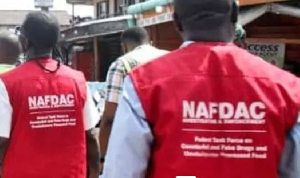Last week,
Ghanaians woke up to the shocking news that a substance alleged to be
cocaine which was seized from an accused
person, and tendered in court as evidence, has changed into washing soda.
The substance confirmed by the police
to be cocaine after testing and weighing 1,020 grammes, later turned out to be
sodium carbonate (commonly known as washing soda) after the court had ordered
another test to be conducted by the Ghana Standards Board (GSB).
Justice Eric
Kyei Baffuor whose court took custody of the banned substance, has expreesed
surprise at the turn of event, and indicated that as far as he was aware, the
cabinet in his chambers where exhibits are kept, was neither broken into nor
tampered with.
He further indicated that he had no direct dealing with exhibits, and that the
only time he dealt with them, especially those relating to documents, was when
he needed to rely on them for his rulings.
The
police on the other hand, have also said that they have no hand in the
transformation of the substance, since the court received the cocaine in its
original state after the Food and Drugs Board tested it. The Ghana Police Service
has said that it cannot fathom why more than thousand grammes of cocaine
presented to the court as evidence against a woman being tried for alleged drug
peddling, turned into baking soda.
The
Executive Secretary of the Narcotics Control Board,Mr. Yaw Akrasi-Sarpong, has
asked very pertinent questions regarding the matter, and I think that they are
worth pondering over if we really want to get to the bottom of the issue.
“Where is the
rest of that cocaine, or where is the rest of the baking powder? This question
is pertinent because it is not the court that destroys exhibits. Infact, when
we are destroying, we invite them. We want to know where the rest of that
substance is. Has it been resealed? Why is it that the court used a certain
measure to judge? They are supposed to be repositories of justice and yet they
could not follow the correct procedure,” Yaw Akrasi-Sarpong said.
The critical
questions we need answers to are embedded in Akrasi-Sarpong’s argument, and the
BNI must pose these serious questions to those who matter in this saga.
The other
angle we must look at critically is, what the law says regarding destruction of
such substances after they have been tendered as evidence.
Act 30, section 9A on the destruction of narcotic drug
before a court in a trial states:"Where the offence involves a narcotic
drug the court shall,
(a) on an application by or on behalf of the
Attorney-General, order the destruction of quantity, leaving a reasonable
quantity of the seized narcotic drug which is the subject matter of the
offence; and(b) make an order that the remaining quantity be taken as conclusive
evidence of the seized narcotic drug for the purposes of the trial of the
offence and any appeal after conviction.
The question
is, why should the evidence be destroyed when the case has not been concluded?
I shall be
back
Emmanuel Dela Coffie
www.delacoffie.wordpress.com
Opinions of Friday, 23 December 2011
Columnist: Coffie, Emmanuel Dela














